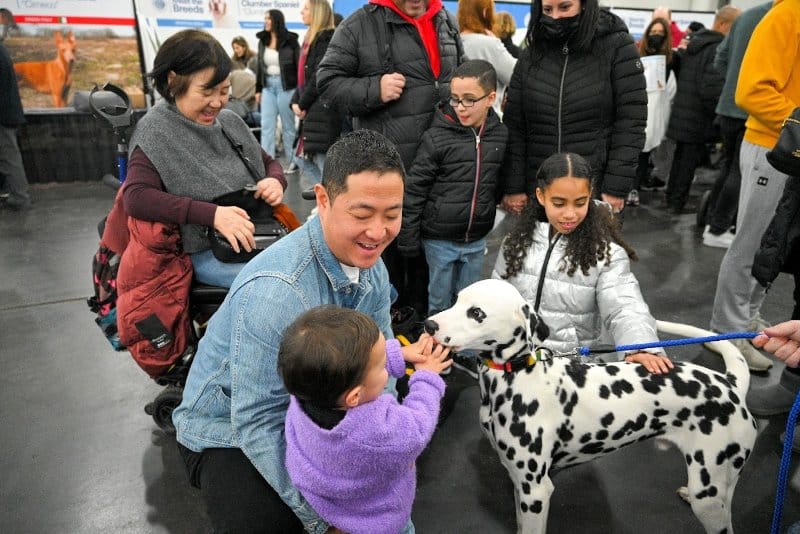Key Takeaways
- Researching dog breeds is crucial to find a pet that fits your lifestyle and family dynamics.
- Choosing a dog based on appearance alone can lead to unexpected behavioral challenges.
- Different breeds have unique historical purposes that influence their behavior and needs.
- Understanding a breed’s energy level, grooming needs, and temperament is essential for a successful adoption.
- Consulting experts and meeting breed owners can provide valuable insights into potential challenges and rewards.
Crucial Reasons to Research Dog Breeds Before Adoption
When it comes to adopting a dog, many people make the mistake of falling in love with a photo or a brief profile bio. While it’s easy to be charmed by a cute face, this approach can lead to mismatched expectations and challenges. It’s vital to dig deeper and understand the breed’s characteristics and needs. This ensures a harmonious relationship between you and your new furry friend.
Finding the Right Match for Your Lifestyle
Each dog breed comes with its own set of traits and requirements. Some breeds are highly energetic and need plenty of exercise, while others are more laid-back and content with lounging around. It’s important to assess your own lifestyle and determine which breed aligns with it. Consider your daily routine, activity level, and the amount of time you can dedicate to a dog.
For example, if you live in a small apartment and lead a busy life, a high-energy breed like a Border Collie may not be the best fit. On the other hand, a smaller, more independent breed like a French Bulldog might thrive in that environment. The key is to match the dog’s needs with your lifestyle to ensure a happy coexistence.

“The Right Dog For You – Choosing A …” from www.amazon.com and used with no modifications.
Avoiding Common Adoption Mistakes
Adopting a dog is a long-term commitment, and it’s important to make informed decisions. One common mistake is choosing a dog based solely on appearance. While a dog’s looks can be appealing, they don’t provide insight into the dog’s behavior, temperament, or needs. Without proper research, you may find yourself unprepared for the challenges that come with certain breeds.
To avoid this pitfall, take the time to learn about different breeds and their characteristics. Understand their energy levels, grooming requirements, and potential health issues. For instance, if you’re considering adopting a Briard, knowing their grooming needs and temperament can be crucial. This knowledge will help you make a more informed decision and ensure a successful adoption experience.
Why Choosing a Dog Based on Looks Alone is Risky
It’s easy to get caught up in the allure of a dog’s appearance. After all, who can resist a fluffy coat or those soulful eyes? However, looks can be deceiving, and choosing a dog based on appearance alone can lead to unexpected challenges. It’s important to look beyond the surface and consider the breed’s behavior and needs.
The Limitations of Appearance in Determining Behavior
While a dog’s appearance can give some clues about its breed, it doesn’t tell the whole story. Two dogs of the same breed can have vastly different personalities and behaviors. Factors such as genetics, upbringing, and environment all play a role in shaping a dog’s behavior.
For instance, a Golden Retriever is known for its friendly and gentle nature, but individual dogs may vary in their temperament. Without proper research, you may end up with a dog that doesn’t fit your expectations. Therefore, it’s essential to go beyond looks and delve into the breed’s characteristics and needs.

“Best Behaved Dog Breeds: Does Breed …” from theonlinedogtrainer.com and used with no modifications.
Common Behavioral Traits by Breed
Understanding common behavioral traits associated with specific dog breeds can help potential adopters make informed decisions. Each breed was developed for particular tasks, which influences their behavior today. For instance, herding breeds like Border Collies are highly intelligent and energetic, requiring mental stimulation and exercise. On the other hand, breeds like Basset Hounds, originally bred for hunting, tend to be more independent and stubborn.
These traits can have a significant impact on how a dog behaves in a home environment. It’s important to recognize that while breeds have general tendencies, individual dogs may exhibit variations. This means that not every Labrador Retriever will be outgoing, nor will every Chihuahua be yappy. However, having a general understanding of a breed’s characteristics can provide valuable insights into what to expect.
Moreover, knowing these traits can help you prepare for potential challenges and tailor your training and care to suit your dog’s needs. For example, a high-energy breed will benefit from regular exercise and interactive toys, while a more independent breed may require a different approach to training.
- Herding Breeds: High intelligence, energetic, require mental stimulation.
- Hunting Breeds: Independent, may have a strong prey drive.
- Companion Breeds: Typically sociable, may experience separation anxiety.
- Working Breeds: Strong, loyal, may require firm training and leadership.
Role of Genetics and Environment in Behavior
Genetics plays a significant role in determining a dog’s behavior. A dog’s breed can give clues about their natural instincts and tendencies. For example, a Labrador Retriever may have a natural affinity for retrieving objects, while a Beagle might have an acute sense of smell and a tendency to follow scents.
However, environment and upbringing are equally important in shaping a dog’s behavior. A well-socialized dog, regardless of breed, is more likely to be well-adjusted and adaptable. Early experiences, training, and socialization can significantly influence how a dog behaves as an adult. Therefore, it’s essential to provide positive experiences and consistent training to help your dog reach its full potential. For more insights, you can explore how dog breed affects behavior according to studies.
Assessing a Dog’s Compatibility with Your Family
Choosing the right dog for your family involves more than just picking a breed you like. It’s crucial to assess whether a dog’s characteristics align with your family’s lifestyle, living situation, and expectations. This ensures a harmonious relationship and reduces the likelihood of behavioral issues. For instance, if you’re considering a spaniel, you might want to explore the Brittany Spaniel adoption guide to understand its history and suitability for your family.
Consider factors such as your family’s activity level, the amount of time you can dedicate to a dog, and the space available in your home. Additionally, think about how the dog will interact with children or other pets in the household. Taking these factors into account will help you find a dog that fits seamlessly into your family. For example, learn more about the Boykin Spaniel’s traits to see if it suits your lifestyle.

“lifestyle with the right dog breed” from zoeta-dogsoul.com and used with no modifications.
Activity Level and Exercise Needs
Different breeds have varying activity levels and exercise needs. Some dogs require more physical activity to stay happy and healthy, while others are content with less. It’s important to match a dog’s energy level with your own to ensure a good fit.
- High-Energy Breeds: Require daily vigorous exercise, such as running or agility training.
- Moderate-Energy Breeds: Enjoy regular walks and playtime but don’t need intense exercise.
- Low-Energy Breeds: Prefer short walks and are often more relaxed and sedentary.
Before adopting, evaluate your daily routine and consider how much time and effort you can realistically dedicate to exercising a dog. A high-energy breed may become frustrated and develop behavioral issues if not given enough physical and mental stimulation. For those considering a smaller breed, the Brussels Griffon is a great option to explore.
For example, if you enjoy outdoor activities and have a spacious backyard, a high-energy breed like a Siberian Husky might be a great companion. Conversely, if you prefer a more relaxed lifestyle, a breed like a Bulldog may be more suitable.
Space and Living Environment Constraints
The size of your living space can also influence your choice of dog breed. Larger breeds may require more room to move around comfortably, while smaller breeds may be more adaptable to apartment living. It’s important to consider how much space you can provide and whether it meets the needs of the breed you’re considering.
Additionally, consider your neighborhood and the availability of outdoor spaces for exercise. If you live in an urban area with limited access to parks, you may need to make extra efforts to provide exercise opportunities for a high-energy breed.
Child and Pet Friendliness
If you have children or other pets, it’s essential to choose a breed known for being friendly and tolerant. Some breeds are naturally more patient and gentle, making them better suited for families with young children. Research breeds that have a reputation for being good with kids and other animals to ensure a harmonious household.
Steps for Conducting Thorough Breed Research
Conducting thorough research is the key to making an informed decision when adopting a dog. Start by gathering information from reliable sources, such as breed clubs, reputable breeders, and veterinarians. These experts can provide valuable insights into the characteristics and needs of different breeds.
Consider attending dog shows or breed-specific events to observe different breeds in action and speak with knowledgeable owners. This firsthand experience can give you a better understanding of what to expect and help you narrow down your choices.
Additionally, online resources, such as breed-specific forums and social media groups, can provide a wealth of information and real-life experiences from dog owners. Engaging with these communities can help you learn about potential challenges and rewards associated with different breeds.
Utilizing Reliable Resources and Experts
Reach out to local veterinarians, animal behaviorists, and experienced dog trainers for advice on choosing the right breed. These professionals can offer valuable guidance and help you understand the specific needs of different breeds.

“Meet the Breeds – A Hat Trick of Wins …” from showsightmagazine.com and used with no modifications.
Attending Dog Shows and Meeting Breed Owners
Attending dog shows and events is an excellent way to see various breeds up close and personal. You’ll have the opportunity to observe their behavior, ask questions, and learn from experienced breeders and owners. This firsthand experience can provide valuable insights into a breed’s temperament and suitability for your lifestyle.
Meeting breed owners can also give you a realistic understanding of the day-to-day responsibilities and challenges of owning a particular breed. Don’t hesitate to ask about their experiences, both positive and negative, to get a well-rounded perspective. For more insights, you can explore how dog breed affects behavior in various settings.
By investing time and effort into researching dog breeds, you can make an informed decision that benefits both you and your future furry companion. Remember, a well-matched dog will bring joy and companionship for years to come.
Conclusion: Embracing Informed Adoption Decisions
Making informed decisions when adopting a dog is not just about finding a pet; it’s about welcoming a new family member who will share your life and home. By understanding the importance of breed research, you set the foundation for a rewarding relationship. This approach ensures you choose a dog that fits seamlessly into your lifestyle, minimizing potential challenges and maximizing the joy of pet ownership.

“5 Dog Breeds That Will Make a Great …” from www.bullybillows.com and used with no modifications.
Long-Term Benefits for You and Your Dog
When you choose a dog that aligns with your lifestyle and expectations, both you and your pet benefit. A well-suited match leads to a happier, healthier dog who thrives in their environment. This, in turn, enhances your experience as a pet owner, as you enjoy the companionship and love of a dog who fits naturally into your family dynamic.
Moreover, informed adoption decisions can prevent issues such as behavioral problems, health complications, and mismatched energy levels. By investing time in research and understanding your chosen breed, you contribute to a lifelong bond filled with mutual respect and affection.
Frequently Asked Questions
Adopting a dog is a big decision, and it’s natural to have questions. Here are some common inquiries that potential dog owners often have:
Does the breed influence how trainable a dog is?
Yes, breed can significantly influence a dog’s trainability. Some breeds, like Border Collies and Poodles, are known for their intelligence and eagerness to learn, making them highly trainable. Others, like Bulldogs and Basset Hounds, may be more stubborn and require patience and consistency in training. Understanding the general trainability of a breed can help you tailor your training approach to meet your dog’s needs.

“Dog Breed Questions You’ve Always …” from www.diamondpet.com and used with no modifications.
What if I am attracted to the looks or size of a dog but its energy level or grooming needs don’t match my lifestyle?
It’s common to be drawn to a dog’s appearance, but it’s crucial to consider the practical aspects of pet ownership. If a dog’s energy level or grooming needs don’t align with your lifestyle, it may lead to frustration for both you and the dog. Consider compromising on certain traits or exploring other breeds that meet your aesthetic preferences while fitting your lifestyle better. Consulting with breeders or rescue organizations can provide guidance on finding a suitable match.
How do I research the health issues of a breed?
Researching a breed’s health issues involves consulting reputable sources such as breed clubs, veterinary websites, and breed-specific health organizations. These resources often provide information on common genetic conditions and health concerns associated with specific breeds. Speaking with veterinarians and breeders can also offer insights into potential health risks and preventive care measures. Being informed about a breed’s health predispositions helps you prepare for any medical needs your dog may have. For instance, if you’re considering a Boykin Spaniel, you might want to explore the adoption pros and cons to understand the breed better.
Are there specific breeds better suited for apartment living?
Yes, certain breeds are more adaptable to apartment living due to their size, energy level, and temperament. Smaller breeds like French Bulldogs, Dachshunds, and Cavalier King Charles Spaniels are often well-suited for apartments because they require less space and have moderate exercise needs. Additionally, some larger breeds, like Greyhounds, are surprisingly well-suited for apartment life due to their calm demeanor and minimal exercise requirements. Always consider your specific living situation and the individual dog’s needs when choosing a breed for apartment living.


